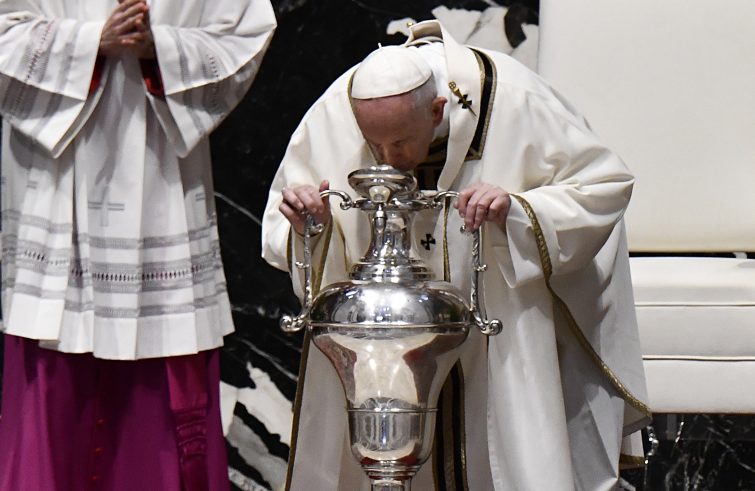
“Spiritual worldliness, pragmatism of numbers and functionalism” are “three spaces of hidden idolatry in which the Evil One uses our idols to weaken us in our vocation as shepherds and, little by little, separate us from the benevolent and loving presence of Jesus, the Spirit and the Father.” They were listed and analysed by the Pope in his homily for the Chrism Mass on Holy Thursday, attended by 2,500 faithful and 1,800 priests. “Allowing the Lord to see those hidden idols strengthens us against them and takes away their power”, Francis said, for there, “in those spaces, we mark out as exclusively ours, the devil insinuates himself with his poison.” “Even though we might tell ourselves that we know perfectly well the difference between God and an idol, in practice we take space away from the Trinity in order to give it to the devil, in a kind of oblique worship.” It is the worship “of one who quietly yet constantly listens to his talk and consumes his products, so that in the end not even a little corner remains for God”, the Pope explained. “He is like that, he works quietly and slowly”, the Pope continued off-text, referring to the “’educated demons’, those that Jesus said are worse than the one who was cast out. They are ‘polite’, they ring the bell, they enter and gradually take over the house.” “There is something about idols that is personal”, Francis remarked. “When we fail to unmask them, when we do not let Jesus show us that in them we are wrongly and unnecessarily seeking ourselves, we make room for the Evil One.” “We need to remember that the devil demands that we do his will and that we serve him, but he does not always ask us to serve him and worship him constantly”, the Pope warned: “But beware, he is a great diplomat. Receiving our worship from time to time is enough for him to prove that he is our real master and that he can feel like a god in our life and in our heart.”
“One space of hidden idolatry opens up wherever there is spiritual worldliness, which is ‘a proposal of life, a culture, a culture of the ephemeral, of appearances, of the cosmetic.’” – is Francis’ first denunciation: “The worldly attitude of seeking our own glory robs us of the presence of Jesus, humble and humiliated, the Lord who draws near to everyone, the Christ who suffers with all who suffer, who is worshiped by our people, who know who his true friends are. A worldly priest is nothing more than a clericalized pagan.”
“The majority cannot be the definitive criterion for discernment : this is not good This cannot be the sole method or criterion for the Church of Christ.” The Pope thus guarded against the “hidden idolatry” that “opens up with the kind of pragmatism where numbers become the most important thing.” “Those who cherish this hidden idol – he remarked – can be recognized by their love for statistics.” But persons “cannot be ‘numbered’, the Pope warned: “in this fascination with and love of numbers, we are really seeking ourselves, pleased with the control offered us by this way of thinking, unconcerned with individual faces and far from love.” Those who “are more enthusiastic about the roadmap than about the road”, are victims of hidden idolatry that comes from functionalism. “’Functionaries’ take no delight in the graces that the Spirit pours out on his people, from which they too can ‘be nourished’ like the workers who earns his wage”, is the Francis’ depiction:
“The priest with a functionalist mindset has his own nourishment, which is his ego.
In functionalism, we set aside the worship of the Father in the small and great matters of our life and take pleasure in the efficiency of our own programmes”: “This shows an attitude of vainglory on the part of the shepherd, an attitude that weakens the union of his people with God and forges a new idol based on numbers and programmes and pastoral plans. Concealing these idols (as Rachel did), and not knowing how to unmask them in our daily lives, detracts from our fidelity to our priestly covenant and makes our personal relationship with the Lord become lukewarm.” Finally, the Pope said in his concluding remarks, “possessiveness is the fertile soil in which these idols grow.” “Jesus is the only ‘way’” to avoid it, “the only way that leads to proper discernment, as we measure ourselves against him each day. It is as if, even now, he is seated in our parish church.” Only Jesus can destroy these “hidden idols” lest “the weeds of these idols that we were able to hide in the folds of our hearts may spring up anew”, Francis said.












